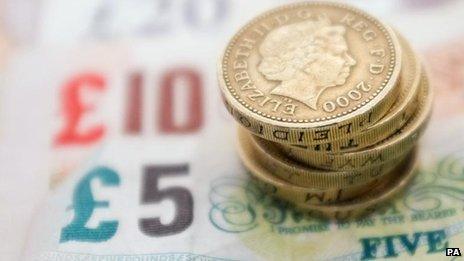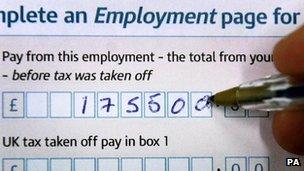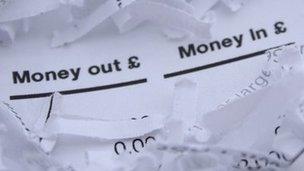Autumn Statement 2013: What we already know
- Published

The UK economy is showing signs of life, but austerity measures persist
A year ago, Chancellor George Osborne's Autumn Statement was so packed with plans affecting people's finances that it was dubbed a mini-Budget.
Four-and-a-half months on, he delivered a Budget speech that included big interventions in the housing market and a cancellation of a planned fuel duty rise.
Now, with the UK economy showing signs of revival, some commentators suggest he might take a bit of a breather.
"The Autumn Statement is not really going to bring anything new to the table," says Chas Roy-Chowdhury, head of taxation at the Association of Chartered Certified Accountants.
"It is really going to be a case of what was already announced back in March for the Budget, with a few added extras."
However, the political party conference season witnessed some policy irons being thrown into the fire, so the chancellor will now be feeling the heat over how to pay for them.
Consequently, before Mr Osborne stands up to speak, we know about a series of changes that have already been announced that will affect personal finances. Most will come into effect in April.
Income tax
The personal allowance, external will rise to £10,000, from April 2014. This is the first slice of income that all but the highest-paid can earn before income tax kicks in.

Income tax levels have seen significant change during this session of Parliament
It will then increase by the Consumer Prices Index (CPI) measure of inflation in future years, starting from 2015-16.
The Liberal Democrats - who have championed recent rises in the personal allowance - would now like the chancellor to go further.
In 2014-15, the 20% basic rate of income tax will apply to a narrower band of taxable income - £10,000 to £41,865 - which means that the 40% higher rate of income tax will be payable at £41,866 and above.
In subsequent years, this threshold will only go up by 1% a year, drawing more people into the higher rate.
Married couples and civil partners tax break
A new policy announced during the Conservative Party conference, which is set to cost about £700m a year, is proposed to start in April 2015.
Under the government's plans, £1,000 of personal allowance could be transferred from one spouse to another, assuming neither is a higher-rate taxpayer and one is earning less than the personal allowance.
About four million couples, who are married or in civil partnerships, could benefit, with a tax saving of up to £200.
This will need to go through a vote in the Commons.
Benefits
Under the government's austerity measures, the chancellor announced in the Autumn Statement of 2012 that a series of working age benefits and tax credits would only rise by 1% a year for three years.

The benefits bill has been a target for the government's austerity measures
This was a significant moment in welfare policy affecting millions of people, as previously benefits had increased in line with the rising cost of living.
So, for those entitled to them, the benefits that will rise by 1% in April 2014 are:
income support
jobseeker's allowance
housing benefit
income-related employment and support allowance - supporting people who are ill or who have disabilities
the work-related activity group component of employment and support allowance - the benefit received when attending interviews with an adviser
the couple and lone parent elements of working tax credit - which supplements the income of the low paid
the child element of child tax credit - paid to low-income families
the corresponding elements of universal credit - the replacement for some work-related benefits only introduced in a handful of areas so far
The same 1% rise will be seen with:
statutory sick pay
statutory maternity pay
statutory paternity pay
statutory adoption pay
maternity allowance
child benefit
However, benefits for disabled people and carers will increase in line with the rising cost of living as measured by CPI inflation in September, which was 2.7%.
Free school meals
This is another promise made during the party conferences, this time from the Liberal Democrat side of the coalition government.
All infant pupils at state schools in England are to get free school lunches from next September, in a measure costing about £600m a year.
The change - for children in reception, year one and year two - will save parents about £400 a year per child.
Meanwhile, tax-free childcare vouchers will be available for working parents from the autumn of 2015.
Pensions
The simple change in April 2014 is a rise of 2.7% in the state pension, external, to mirror the rising cost of living.

The state pension is rising in line with the increased cost of living
Under the government's triple-lock system, the state pension increase is the highest of CPI inflation in September, average wage rises, or 2.5%. This year, CPI inflation was the highest of the trio.
The current state pension is £110.15 a week. The 2.7% inflation-linked increase would take it to £113.10 - a rise expected to be confirmed by the chancellor in the Autumn Statement.
The more complicated change to pensions tax relief mainly affects higher earners with workplace and private pensions, and takes effect from April 2014.
The lifetime allowance restricts the tax-advantaged pension savings that an individual can accumulate over their career and the limit is being cut from £1.5m to £1.25m.
Meanwhile, there is also a cut from £50,000 to £40,000 in the annual allowance, which limits the amount of tax-advantaged pension saving an individual can accumulate in one year.
Savings
Savers have been hit by low returns on their savings in recent years, with the Bank rate at a record low.
The chancellor has previously announced that the maximum allowance that could be saved in a tax-free Individual Savings Account, external (Isa) would rise with inflation.
This would see the upper limit rise from the current £11,520 to £11,880 in April 2014, although this will need to be confirmed by the chancellor, as he could increase the level further.
Half of this can be saved in a cash Isa, with the rest or the total amount able to go into a stocks and shares Isa.
The government has also been consulting on whether money in Child Trust Funds, can be transferred into their successor - Junior Isas.
Fuel duty

A freeze in fuel duty has been a common thread in the chancellor's speeches
As in many Budgets of recent years, the chancellor cancelled a fuel duty increase planned for this autumn.
This would have added about 3p to the cost of a litre of petrol or diesel.
The next fuel duty rise is scheduled for September 2014.
Alcohol escalator
The alcohol duty escalator - which adds inflation plus 2% to the price of drinks - was abolished for beer completely in the last Budget.
However, it still exists for wine and spirits.
Energy
The government has outlined plans to change some of the green levies included in energy bills in order to reduce the pain of price rises.
These should take about £50 off the average household annual domestic dual-fuel bill, although prices for most households will still be higher than they were a year ago.
Other plans
The government has been consulting on whether the self-employed should make all National Insurance payments through the self-assessment system, rather than the present system, which sees some paid by direct debit.
Reviews into various elements of taxation have been carried out by the Office of Tax Simplification.
The BBC understands that increases in business rates in England and Wales will be capped at 2% rather than linked to RPI inflation. The chancellor will also announce the extension for another year of a scheme which gives small firms relief from rates liability.
But he will stop short of announcing a full review of a system which is widely seen as out-dated - despite calls for such a move by some industry groups and the business secretary Vince Cable.
There have also been consultations about the inheritance tax regime for trusts, the taxation of partnerships, and tax reliefs for employee ownership of firms.
Patricia Mock, tax director at accountants Deloitte, said: "The Autumn Statement will see the outcomes of various consultations, which are likely to result in new measures which will impact people on higher incomes.
"Lower earners will welcome the £10,000 personal allowance from 2014-15 and confirmation of the transferable personal allowance [for couples] of £1,000 from 2015-16."